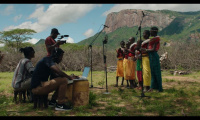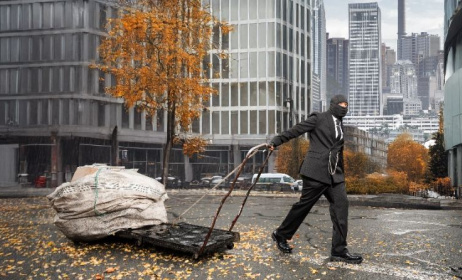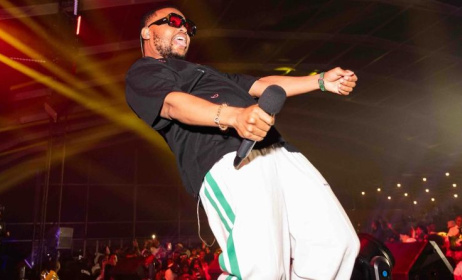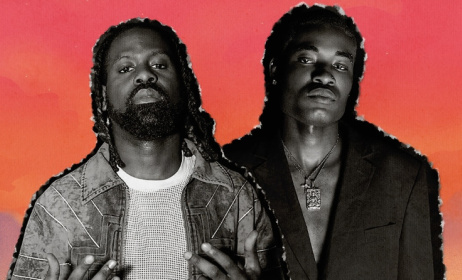Interview: Tanzanian rapper Wakazi ahead of Sauti za Busara 2020
Tanzanian rapper Wakazi is one of the many artists expected to bring unrestrained energy to Sauti za Busara when the festival kicks off in Stone Town, Zanzibar, on 13 February.
 Wakazi should be a favourite with the Sauti za Busara crowd.
Wakazi should be a favourite with the Sauti za Busara crowd.
The self-described ‘bilingual beast’, who rhymes in English and Swahili, speaks highly of platforms like Sauti za Busara, which propels local artists. "I am looking forward to my performance,” he tells Music In Africa. “My band and I have prepared something the fans will love. We hope the opportunity will open doors to more festivals locally and abroad. I am so up for the challenge.”
But Wakazi says he’s also looking forward to discovering new sounds at the eclectic festival. “I would love to see Evon, Siti & The Band, Blinky Bill and Ambasa Mandela. They are incredible. But certainly, I would like to see acts I'm not familiar with. There is no better way to discover new artists than experiencing them performing live. The euphoria is unmatched!”
Wakazi became known in Tanzania after performing at the eviction show of Big Brother Africa in 2013. Since then, he has released a repertoire of eight mixtapes and an LP.
It seems like success from every angle but he’s quick to check my enthusiasm. “The so-called gatekeepers in the industry deny bilingual artists like me a fair shot to prosper, and as you know now across Africa, all the top emcees – Sarkodie, Khaligraph Jones, M.I, Cassper Nyovest, Nasty C, Kiff No Beat and Nyashinski, among others – are at least bilingual.”
I ask him how he feels about the Tanzanian music industry. “It is very vibrant and competitive but underground music does not sell through exposure on radio or TV,” he says, adding that the country’s radio stations playlist overly commercial sounds like Afrobeats, bongo flava and US hip hop and R&B.
And mainstream hip hop is in limbo – it sounds like US trap or Afrobeats tunes. “The need to achieve quick success makes our artists conform to bubble gum content, hence the loss of originality and authenticity. Nevertheless, there are underground movements that if given proper support could change the dynamics.”
In Tanzania and other parts of East Africa, bongo flava is the mainstream genre, with hip hop still regarded as an underground movement. How did bongo flava spread across East Africa from its working-class roots in Dar es Salaam?
“There is this juggernaut called social media,” Wakazi says. “Our hip hop artists have not capitalised on social media as they should. That is the alternative to traditional media like TV and radio, which has proven to work.
“For Instance, the likes of Diamond Platnumz and others signed to his Wasafi crew do not depend on radio, and they all blew up via social media. It's evident that we are letting ourselves down.”
It is also evident that Wakazi is well-versed in the complexities of the Tanzanian music industry. When asked what's keeping it from reaching its potential, he says: “Our industry lacks a functional ecosystem in terms of operation. No professionalism, work ethic, vision, and so on. The government has not done what is necessary to create a friendly environment and infrastructure, such as implementing intellectual property laws for artists to operate and thrive.
“There are not enough royalty collections made. The worst is that the artists are not registered with the Copyright Society of Tanzania. As a result, even the little that is collected does not reach them. Also, artists have no clue of what their intellectual property is worth. They target performance fees only and forget other revenue streams.”
Sauti za Busara is a platform that encourages artists to take up civil responsibility. Last year, the festival’s theme was Say No to Corruption and Wakazi, who uses his music to raise social issues, should fit right in with the festival’s ethos.
"My socio-political activism is something that is not only in my music but also on my social platforms. It is misinterpreted at times and leads to a polarising fan base and the deprivation of some opportunities. It's a continual struggle,” he says.
“I strive to talk about issues that are relevant in my community, about gender discrimination, child abuse and trauma. I would give up a popular hit song and all the commercial attributes that come with it just to do a socially conscious song that could make a difference and uplift my people.”
So what should we expect from Wakazi in 2020? “Between now and my Sauti za Busara show, I might drop a couple of singles. And it's Valentine’s season so I will probably have something special for the lovers. We’ll see what happens. But music is on deck!”





























Comments
Log in or register to post comments